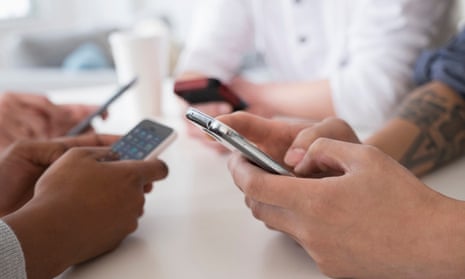Our love of social media seems to have grown and grown in the past decade, but recent studies show the tide may be turning for some platforms, with young people in particular ditching Facebook. One study claims that more than 11 million teenagers left Facebook between 2011 and 2014. It’s been argued that they are swapping public platforms such as Twitter and Instagram for more private messaging apps like WhatsApp and Snapchat.
We asked the Guardian’s younger readers whether they have quit social media and why, as well as what apps they are ditching. Almost all reported a greater sense of happiness after going offline. Here, we share some of their experiences.
Daisy, 23, Manchester: ‘I feel less anxious and less like a failure’

After a romance ended with a guy I really liked, I kept trying to avoid Facebook so I wouldn’t have to see him. It was after this that I gradually switched off from it, but before that I’d been wanting to quit for a while.
Facebook made me feel anxious, depressed and like a failure. When I went online it seemed like everyone was in Australia or Thailand, and if they weren’t travelling they were getting engaged or landing great jobs. I felt like everyone was living the dream and I was still at home with my parents, with debt from my student loan hanging over me.
I also felt that if I wasn’t tagging myself at restaurants or uploading photos from nights out, people would assume I wasn’t living. I remember a friend from uni said to me once, “Yeah, but you’re still going out having fun, I’ve seen on Facebook.” I tried to present myself as always having a great time. If my status didn’t get more than five likes, I’d delete it.
My life has changed for the better since deleting social media. I now enjoy catching up with my friends, and when they tell me new plans my response isn’t just, “Yeah, I saw on Facebook.” It makes you realise who your real friends are and how social media takes the joy out of sharing news with people. I also feel less anxious and less of a failure.
I’m planning to visit a friend in Australia next month, and she and my mum and a couple of other friends want me to go back on Facebook to share my pictures. I’d really prefer not to, though. I’m on Instagram, but I mostly follow sarcastic quote pages. I’ve never had a Twitter account.
George Lincoln, 17, Hampshire: ‘A lot of young people aren’t interested in Facebook any more’

When I first got Facebook, it appealed to me because I could talk to all my friends and see how they were feeling, but now it seems to have become more trivial. Instead of seeing what friends are putting up, I just see the articles that they “like” and other comments I’m not interested in. I want to concentrate on more useful things and I find it very distracting. I don’t worry about missing out on stuff, because I still use the Messenger app on Facebook to stay in touch with everyone.
I’ve been off Facebook for two weeks now and I don’t really feel tempted to go back. I’ve thought a few times about logging back in but I haven’t so far. Since I quit, no one has really spoken to me about it; everyone is busy focusing on college work.
A lot of young people aren’t interested in Facebook any more – it’s become really overcrowded and other sites such as Snapchat are offering something new and exciting.

Ben, 21, Surrey: ‘I have a much more positive mindset now’
I made a New Year resolution to cut down on my social media use. After doing this I started to ask, why am I using it at all? That’s why I’ve quit various platforms over the past year: Snapchat in November and Facebook in June. I’ve never really had WhatsApp or Twitter. I mainly used Facebook at university, for organising events and meet-ups, but I’ve gradually started to realise how pervasive is it. I also feel uncomfortable with the amount of time I used to spend on it.
I’ve always found social media to be an environment in which people constantly seek attention and validation through one-upping people’s comments, and boasting over likes and retweets.
We’ve not needed social media for thousands of years and now it feels like people think your life is over if you don’t have it, which is ridiculous. I joined when I was 13, but I don’t feel like I really knew what I was signing up for and the platform has changed a lot over the years. There’s much more advertising on it now, for example.
I didn’t find it hard to quit and, after a while, contacting people through other means became the norm. People completely respect my not being on social media, and some wish they could do it too. Since I left, I’ve spoken to people about it and that’s convinced them to do the same.
I’m more productive and less concerned with what other people think about me – now, the only person I have to regularly compare myself with is me. I’m in a much more positive mindset without social media than I ever was with it. It’s let me see who my friends truly are, and who I was only concerned with simply because they were there on social media. I now use a basic non-smartphone and email as my only forms of communication, and people have adjusted to it.

Syed Ali, 19, Birmingham: ‘I don’t need to prove anything to people’
There’s so much negativity on social media, with people complaining about how tough their lives are (and these are the same people who post a picture of every meal they eat). That’s part of the reason I haven’t been using it for the past three years.
Posting on social media is quite frustrating because it feels like everyone is conforming to the norms, and you have to post photos of yourself (every place you visit, etc). Some people merely “like” your pictures so you return the favour – it’s childish. I don’t need to prove anything to people or show people I’m doing well. This has made me a much happier person.
Rosanna Cassidy, 25, Nottingham: ‘I can live my life instead of trying to shape it into one that looks good online’

I’d been thinking about quitting Facebook for a long time, but the EU referendum finally made me bite the bullet. I was sick and tired of people trying to force their political beliefs upon me, and I found it so depressing that people were repeating views they had heard that weren’t true.
Now, three months later, without Facebook I feel much happier and more content. I can live my life instead of trying to shape it into one that looks good online. I also have a lot more time now, and it’s easy enough to keep in touch with my friends in other ways. What’s more, now we can have conversations about what we’ve been doing because we haven’t seen it all already on social media.
I don’t plan on going back to Facebook, but I still have my Instagram account, which I check once a day. Instagram is different because it’s not as time-consuming, and you don’t get bombarded with other people’s views. Plus, the Instagram community is more supportive. I gave up Twitter years ago because it didn’t really feel like it had a point, and it was just a space for opinionated people to air their views in a non-constructive way.
Kevin, 23, Dublin: ‘I enjoy actually talking to people face to face’

When I used Facebook, I found myself aimlessly watching videos and scrolling through articles that I never had any interest in reading in the first place. Furthermore, the Facebook statuses I saw were very uninspiring.
Leaving Facebook was one of the best decisions I’ve made this year. Aside from the increased productivity that comes from not having it, I enjoy actually talking to people face to face, and not seeing what someone I met once, years ago, had for breakfast.
I do, however, forget to wish a lot of people happy birthday and I seem to be months behind in finding out some news – but I find out eventually.
Sophie, 18, Surrey: ‘I used to check for updates countless times a day. Now, I’m free’
I’ve never really used Instagram and Tumblr because I don’t see the point of them. I had Twitter for news updates when I was in school and sixth form, but stopped using it when my exams started. As for Facebook, I only ever used it to contact my friends, but Skype chats and other apps mean I don’t need it any more.
I’ve been free from the chains of social media for about six months now, which doesn’t seem like a lot of time, but it feels like it now that my time isn’t being sapped by these apps. It sounds so silly, but since leaving I feel like my own person. Before, Facebook and Twitter became almost like extra arms attached to me that I constantly had to be aware of. I used to check for updates countless times every day. Now, I don’t have to be reliant and dependent on it any more – it’s like a breath of fresh air. I don’t plan on going back, except for maybe WhatsApp if I need to talk to people when I’m abroad.
- Some names have been changed.

Comments (…)
Sign in or create your Guardian account to join the discussion